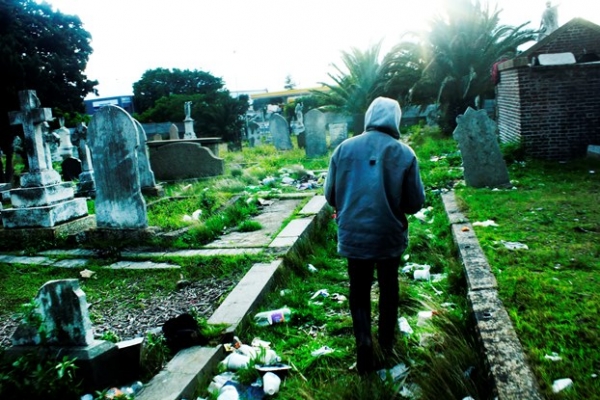Living in a graveyard

For the past few years, the old Jewish burial site located south of Groote Schuur Hospital in Cape Town has become a home to a number of homeless people.
Unathi Lujabe (32) from Gugulethu lost both of his parents when he was still a baby. He left his little sister with the family three years ago to live the “ghetto life” as he calls it.
“I left home because I couldn’t find work. So, instead of living off my father’s relatives, I chose to be a man,” said Lujabe.
According to Lujabe, the site is for anyone who wants to live in it. People come to look for a place to sleep not a smoking place [for drugs].
“Everybody is here for their own reason. It was not an easy choice to make, but I’m here now … There are a lot of us,” he said.
During the day, they mostly go to town “looking for something to eat”, as one homeless person explained.
It is clear that the site is not safe. Many of the people were openly armed with knives and other sharp objects while talking to GroundUp.
All Lujabe owns is a small mattress, two blankets and the clothes he has on. Lujabe said he had dreams of becoming a successful businessman one day, but things did not go accordingly.
“I can take care of myself,” he said. “To be honest, sometimes I steal, but it is not something I’m very proud of … but with the shopping centre around the corner, I mean … there are people out there willing to help.”
“I wish I had something to look forward to every morning. There is nothing interesting about this life. But this is [where] my new family [is] now. They are all I have,” said Lujabe smiling at his friends.

Mongezi Maziko who recently moved from Muslim Burial site to the old Jewish burial site. Picture by Masixole Feni.
Mongezi Maziko (30) recently moved from the Muslim burial site to start a new life at the old Jewish burial site. He felt he needed a change of scenery.
“My family knows where I live but there is nothing they can do about it. This is how I chose to live my life,” said Maziko. “I was arrested when I was 15 years old for armed robbery and attempted murder, but because I was a minor then, the court granted me free bail and a warning.”
Maziko said peer pressure was the main reason he ended up dropping out of school and running away from home when he was still only in grade nine.
“I have made a lot of mistakes and now I’m living with the consequences. There is nothing great about this life though,” said Maziko.

A sleeping place surrounded by tombstones. Picture by Masixole Feni.
Aubrey Aneke, originally from Zimbabwe, has been living on the streets since 2002, when he was only nine years old.
Aneke wanted to tell his story, but he said he was not in the mood at that moment. He was rushing to town to try and find something to eat. He said he was tired from all the smoking he did the previous night and needed something to eat.
“I smoke tik for a living and that is all I’m going to say. Unless you can give me money, I can tell you more,” he said in a joking way.
The youngest person GroundUp found living on the site was 18-year-old Viola Silver, who had only lived there for a couple of weeks. Silver said she told her parents she lives in a flat in Observatory with friends, because she does not want to move back home.
“I met this girl in Salt River. We became friends instantly and I started walking with her. Then we came here,” said Silver. “I was supposed to go back home yesterday, but then I decided to come back. Its nicer here.”


This article is licensed under a Creative Commons Attribution-NoDerivatives 4.0 International License.


